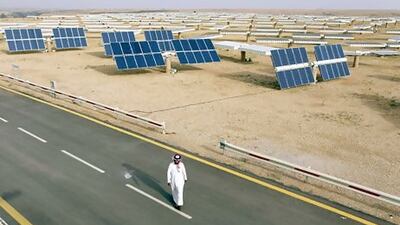Countries and policymakers should adopt a long-term and pragmatic view to energy transition and invest in technology that would increase the efficiency of the process rather than make any abrupt switch, experts and officials say.
Although adding various types of energy sources into the mix is important, governments should try to invest in initiatives that reduce carbon intensity, a panel at the World Economic Forum in Davos heard on Wednesday.
“We have to be inclusive about the source of energy,” Faisal Alibrahim, Saudi Arabia's Minister of Economy and Planning, said during the panel discussion.
“We cannot limit to one source. We also need to think inclusively about technology that can reduce emissions or can improve carbon capture or carbon removal and not just find another source.”
While global organisations such as the International Energy Agency have urged countries to increase investment in clean energy and divest from polluting fuels such as coal, growing demand for energy worldwide as economies recover from the Covid-19 pandemic has prompted calls from the oil and gas sector for a paced transition that would avoid shocks to energy supplies.
Although oil and gas producers aim to become more sustainable, investments in hydrocarbons must not be halted to better manage demand growth, experts said.
Spending in the oil and gas industry took a hit from the pandemic and governments' efforts to transition to cleaner forms of energy.
Total investment in the upstream part of the oil and gas sector fell 23 per cent below pre-coronavirus levels to $341 billion in 2021, the International Energy Forum and IHS Markit reported.
“There should be investments to add capacity,” said Mr Alibrahim.
“Right now in some countries that advocate for quick transition, they would have to burn the dirtiest kind of coal. We could have avoided this had we had a long pragmatic view a long time ago, had we looked at the issues a little more deeply.
“We could have been using hydrocarbons and gas more efficiently and cleanly now when we need it. We should not forget after this crisis that we need to continue this long-term view.”
The panel, which included ministers, members of the private sector as well as academics from the Middle East, also highlighted the need to invest in technology that would make renewables more efficient or reduce emissions, aiding the region's transition.
“Coal-fired plants should make way for natural gas-fired plants. Doing this reduces greenhouse emissions more than the use of electric vehicles. Cutting methane is another way [to reduce emissions],” said Badr Jafar, chief executive of Crescent Enterprises.
“It’s about more smart energy policy and less political rhetoric.”
To achieve transition to more cleaner and efficient forms of energy in the Middle East, there needs to be collaboration between governments, businesses, academics and the public, the panel said.
“Collaboration is key” to ensure sustainable transition in the Middle East as the region looks to mitigate climate change and achieve net zero, said Lamya Al Haj, associate professor of Molecular Biology at the Sultan Qaboos University in Oman.










